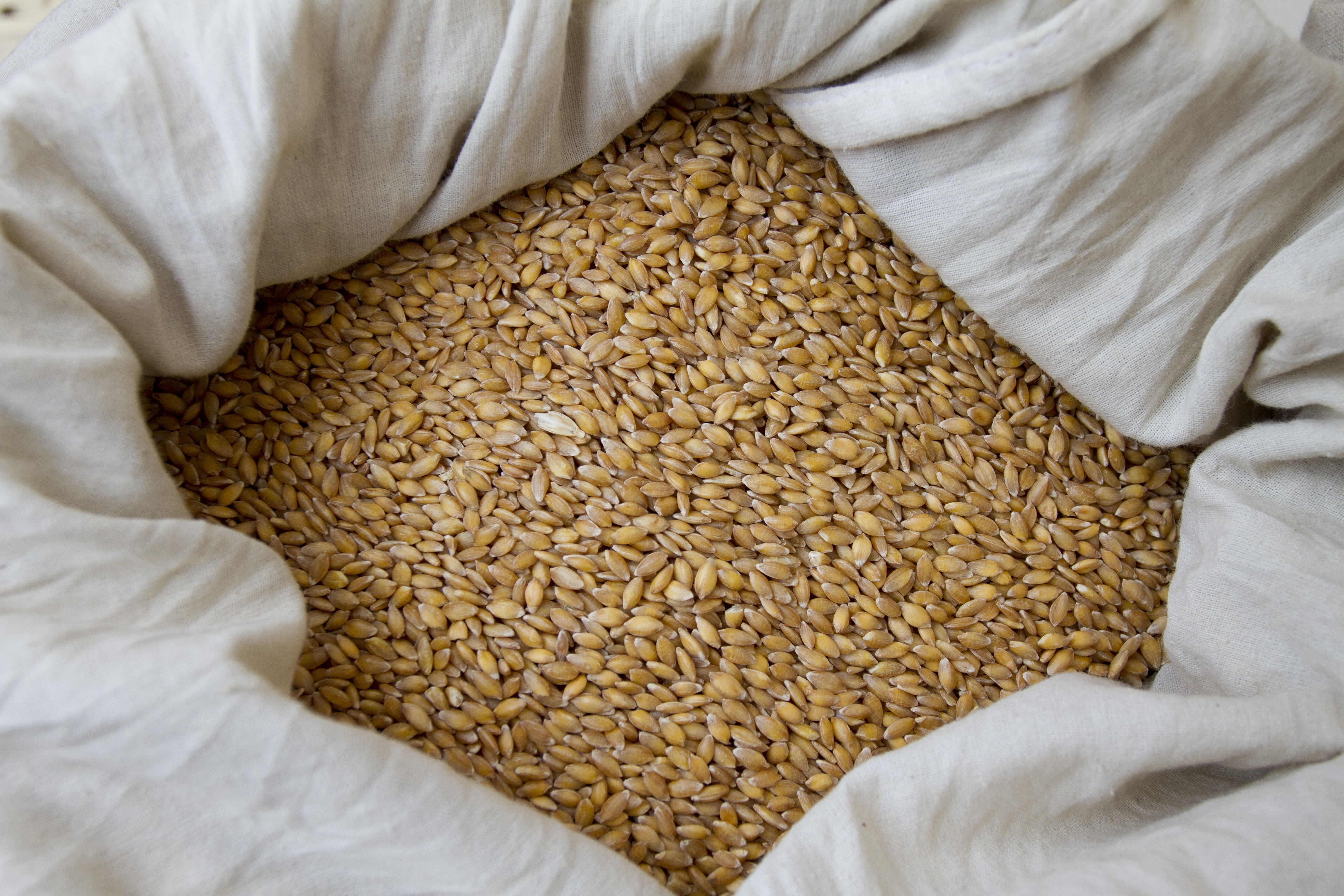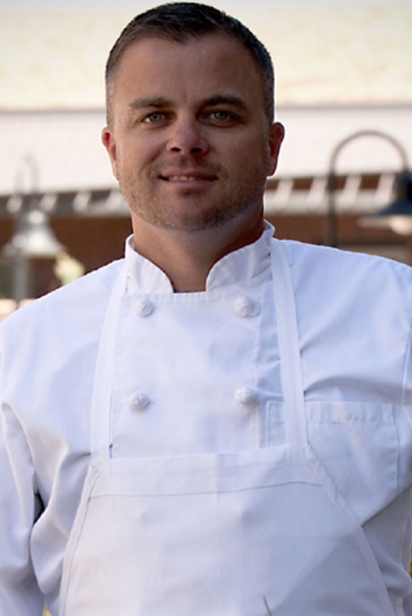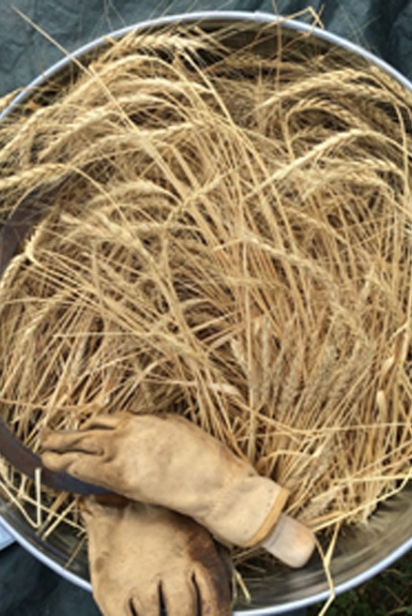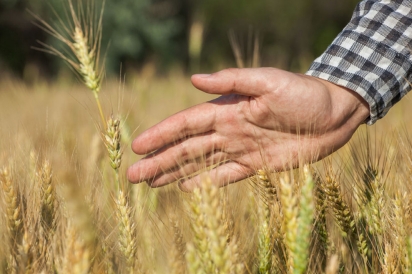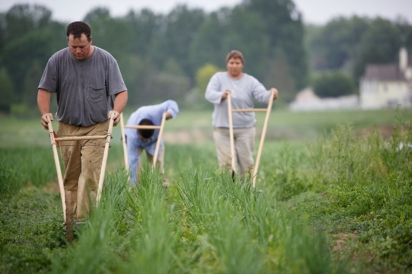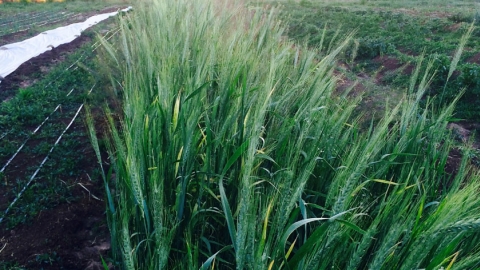Grains of Truth
A Front Range nonprofit is on a mission to save endangered varieties of grain in the name of flavor and the future of farming
Local food advocate and self-proclaimed “grain nerd” Mona Esposito is that enviable person who bakes her own bread and has a pantry stocked with homegrown (and milled) treats. The local food advocate is also the co-founder of the Noble Grain Alliance with her friend Kelly Whitaker, chef/owner of Basta, a wood-fired eatery in Boulder. The 19-month-old organization is dedicated to the cultivation and preservation of heritage grains—antique varieties that fell out of favor with the advent of industrial agriculture, which favored efficiency over flavor and biodiversity.
The Noble Grain Alliance is also working to develop infrastructure to establish regional grain hubs: getting seeds (wheat, corn and other species) to growers and eventually establishing local seed cleaners and millers on the Front Range.
Esposito and Whitaker have collaborated with the Rocky Mountain Seed Alliance on its heritage grain trials, and also work with Nanna Meyer, associate professor and sports dietician in the Department of Health Sciences at the University of Colorado at Colorado Springs (UCCS). Meyer is also the mind behind the institution’s annual Grain School.
Esposito’s interest in heritage grains “stems from a larger interest in local food” and her desire to be connected to what she eats. “I’ve always searched for ways to go back to that traditional way of life,” she says. Whitaker, one of Colorado’s most acclaimed chefs, has honed in on heritage grains as his muse, for which he’s received industry awards and accolades (his farro piccolo risotto, a menu staple at Basta, is now featured at San Francisco’s Michelinstarred In Situ).
Whitaker’s role, in part, is fostering a connection between people and heritage grains. “Human beings and feeding them well are my obsession,” he says. “Food can transform communities in so many positive ways, and if I’m responsible for people’s enjoyment and health, I see grain as an area in which I can have a major impact.”
Whitaker’s mission is coming to fruition as chefs at other Front Range restaurants, including Hosea Rosenberg of Blackbelly Market and Kyle Mendenhall of Arcana, become regular visitors to Basta’s kitchen to experiment with different varieties of heritage wheat. Too, the network of Noble Grain Alliance farmers, including Boulder’s Black Cat Farm (owned by Chef Eric Skokan), is steadily growing as Esposito collects and delivers seeds and makes connections on their behalf. Jason Griffith of Boulder’s Aspen Moon Farm affectionately dubs Esposito the “gluten” of the group, saying “she binds us grain farmers together.”
Esposito’s interest in heritage grains started over a decade ago when she was living in Aspen and was an active member of the food community. She began baking her own bread and soon became aware that her only readily available option for wheat was processed white flour. “It had never occurred to me that we should have more choices for better flavor and nutrition,” she says. “There’s Sonoran White wheat, which is light and has a really amazing texture. There’s Einkorn, which is sort of the mother of all wheats. I’m blown away by the depth of its flavor—it’s so nutty.” She experiments in her home kitchen with a portable mill, using the resulting flour in everything from waffles to pasta. “My daughter and I like to make waffles using different varieties, and it’s really fun to see how she can quickly discern the type of wheat in each waffle simply by its flavor,” says Esposito.
When Esposito moved to Boulder in 2008, she became a regular at Basta and asked to do a weekly “stage” in the kitchen to delve deeper into woodfired cooking. She and Whitaker would talk about the lack of wheat variety and quality flour, always circling back to the same question: “Why have grains been so overlooked in the mainstream movement toward local, good food?”
Grain as a Catalyst for Change
Whitaker, generally reluctant to leverage his chef status, makes exceptions when he feels it can advance an important food security issue. In 2017, he and Esposito joined forces and got local grain farmers like Griffith onboard, yielding often-surprising results. “The Turkey Red, being a winter wheat, came up early, suppressed weeds and yielded 50 percent more than the Red Fife,” he says. Griffith contemplates the farming and culinary benefits, adding, “From a planting and flavor perspective I prefer Turkey Red, and from a baking quality perspective I prefer the Red Fife, which is a softer wheat.” For his next harvest, he’s “super excited” to see how his Ethiopian Blue Tinge Emmer (a variety of farro) does.
As a chef, Whitaker, is also enamored with the culinary possibilities. “Heritage wheats bring complexity to food regardless of cooking method,” he says. “At Basta, we lead with flavor and experience— there’s not a mention of whole grain on our menu but we’re looking for a customer to ask ‘Why does this taste different?’ and we immediately know the answer to give. The spring wheats have a lower protein content and tend to be a little sweeter, so we’ll fold the flour into our crackers, desserts and pastries that don’t need to rise. The winter wheats are earthier and have more protein.” Talking about a hard, white spring wheat called Pasayten, he says, “It’s so naturally buttery, you can make a roll out of it and it tastes like there’s butter already on it.”
Recently, Whitaker was invited to speak at the UCCS Grain School, where he was among nationally recognized grain experts. His hope is that well-known chefs in the public spotlight will help propel the heritage grain movement forward.
Esposito also believes that grain has the potential to be an agent for change. “In the bigger picture, it’s really important for us to be working on our local food economy and to take back control. Everyone used to have access to people growing their food; connected food systems lead to connected communities. I’m hoping this translates to reaching more people and increasing awareness of the importance of a local food system that delivers flavorful, nutritious food and people getting excited about that. I see Noble Grain as a catalyst to this shift in Colorado.” | eA
GO FIND IT!
Visit NobleGrainAlliance.org
to learn more about or to donate to the heritage grain movement.
The Grain School
offers technical courses on growing, milling and baking with heritage grains.


